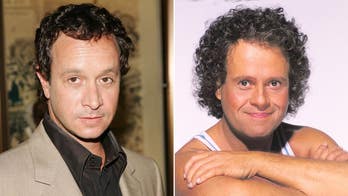
BSFC-00040 SANDRA BULLOCK as Leigh Anne Tuohy in Alcon Entertainments drama The Blind Side, a Warner Bros. Pictures release. (Alcon Film Fund/Warner Bros.)
LOS ANGELES – Last year, China surpassed Japan as the second-largest box office in the world – with theater earnings up 36 percent from the previous year.
Experts now anticipate that in the next five to seven years, the world’s most populous country will jump the United States in gross box office. This means, whether Hollywood studios like it or not, they will likely have to tailor films to suit the Chinese market and appeal to the country’s Communist Party censorship regulations, if they want to have their movies shown there.
Experts tell FOX411's Pop Tarts column this could be a particular problem for films with a strong faith-based theme.
“Christianity in China has long has been associated with Western imperialism and the authorities regard U.S. evangelism, in particular, with some suspicion,” Beijing-based entertainment attorney Mathew Alderson told FOX411’s Pop Tarts column. “Religious matters are handled by the State Administration of Religious Affairs and the involvement of that authority would be likely if a film were to touch on religious matters.”
The Chinese government boasts on its website that "China is a country of great religious diversity and freedom of religious belief. It has over 100 million followers of various faiths,” but that doesn’t mean the Communist Party exactly embraces content promoting a Christian agenda.
“Christian-themed movies are generally shunned by the Chinese film authorities,” Robert Cain, a veteran producer and longtime liaison between Hollywood and China, told FOX411’s Pop Tarts column. “I doubt any of the studios would bother submitting them.”
That would mean turning your back on the world’s second biggest box office, and potentially the biggest in coming years, which could be hard for many producers and studios to do.
“As much as American filmmakers want their freedom of expression, it comes down to money. The film industry is a business, and with China set to be the number one in the film market in the near future, Hollywood needs to look out for themselves,” explained entertainment litigation attorney, Dr. Dariush Adli of Adli Law Group P.C. “Films will continue to be censored according to Chinese guidelines and even created according to these rules. All foreign films, dealing with anything from religion to gambling, have to be screened and pass the test of China’s State Administration of Radio, Film and Television (SARFT). This means that many studio productions are modified or refused completely. Until rules and regulations are changed on SARFT's end, Christian films will always have a hard time passing Chinese censorship.”
That means the decision whether to green light a faith-based movie will be even harder, given the success of these types of movies domestically. One only has to look at the recent ratings success of History Channel’s five-part miniseries “The Bible” which premiered with a whopping 13 million viewers this year and held steady at around 10 million watchers each week, to understand that the desire for Christian entertainment in the U.S. is strong.
There is also the domestic box office success of several religious-themed films in recent times – in 2004 “Passion of the Christ” brought in $370 million, 2006’s “The Nativity Story” made $37 million, 2008’s Kirk Cameron-starring “Fireproof” pocketed $33 million, 2009’s “The Blind Side” made $256 million, and 2011’s “Soul Surfer” made a domestic gross of almost $44 million.
We’re told by an industry insider that “Passion of the Christ” is currently being pitched to join the ranks of “Titanic” and “Top Gun” for a re-release with a high-tech 3D conversion – and although the big-budget, 3D format is usually embraced by Chinese audiences, it is almost certain that this one would not be seen there.
“I doubt the studio would even be bothered submitting it,” a Chinese film expert told us. “For starters, the censors wouldn’t approve the level of violence in Mel’s movie.”
A rep for Gibson did not respond to a request for comment.
But Christianity does appear to be growing in China. Ted Baehr, founder of the faith and traditional values entertainment site Movieguide.com, insists that the Christian genre does well around the world, and that there has been a push for the website to run a service in China.
“According to Niall Ferguson, the author of ‘Six Killer Apps,’ Christianity is growing faster in China than in any other country and there are now more bibles being printed in China than anywhere else in world,” Alderson added. “Thus an emerging Christian influence in Chinese film-making is possible, although it is likely to be subtle and indirect.”






